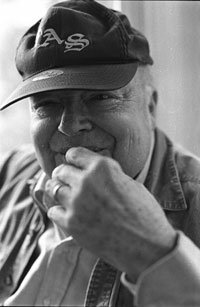COVER- 'Uncle and maestro': Remembering George Garrett
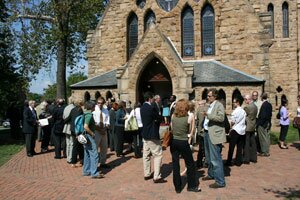
Friends and colleuges gathered at the UVA Chapel on Monday, September 22 to remember writer and UVA professor George Garrett.
PHOTO BY DAVE MCNAIR
At a memorial service last week for writer and UVA professor George Garrett, who died on May 25 after an 18-month battle with bladder cancer, UVA president John Casteen called him a "great man of letters" and a "reader and teacher without peer" and credited him with conceiving of and shaping the University's program in Creative Writing, which is consistently ranked among the best in the Country.
"He took his work seriously," Casteen said to a packed house at the UVA Chapel, "but never took himself seriously."
Indeed, most of the hundred or so people who had come to remember Garrett, all wearing the "Friends of George" buttons that were handed out, smiled and nodded.
Garrett was first hired to teach at UVA in 1962, after beating out finalist James Dickey (eventual author of Deliverance) for a new "creative writing" position in the English Department modeled after the writer-in-residence position that was formerly held by Katherine Anne Porter and William Faulkner. At the age of 32, Garrett had already published seven books, three of them– the novel, Which Ones Are the Enemy?; the collection of stories, In the Knar Patch; and the book of poems, Abraham's Knife– in the previous year. At the time, Porter was hailing him as America's most promising young writer.
However, what made Garrett seem so remarkable a writer to other writers (and often confounded them) wasn't only the sheer volume of it, but the fact that he could be proficient in so many genres– historical novels, experimental fiction, non-fiction, plays, screenplays, poetry, essays, shorts stories– while remaining, as writer and friend Richard Bausch put it, "so marvelously unmoody."
Garrett stayed at UVA until 1967, shaping in the staid hallways of the English Department what would eventually become "Creative Writing Programs" in English departments across the country. He left UVA over questions of his unfinished doctoral dissertation at Princeton, according to an interview with author Madison Smartt Bell published in Chronicles magazine 1998, and spent the next 16 years writing and teaching at various other universities including Princeton and VMI. He received an honorary doctorate from Princeton for his historical novel Death of the Fox and then made a triumphant return to UVA in 1984 as the Henry Hoyns Professor of Creative Writing, a position he held until his retirement in 2001.
Indeed, for the literary world– a world rich with pretentiousness and pomposity– Garrett was an antidote. Despite having a resume that included 11 novels, eight short story collections, eight books of poetry, as well as plays, essays, screenplays, biographies, numerous awards, and an appointment as Virginia's poet laureate, Garrett seldom talked about or drew attention to his own work. In fact, he often delighted in poking fun at his own work.
As evidence of that, Casteen cited how Virginia's poet laureate delighted in talking about a screenplay he co-wrote in the 1960s called Frankenstein Meets the Space Monster, which became a very cheaply produced science fiction film, and later a cult favorite, before it was finally named one of the 50 worst movies ever made in 2004. A master of self-deprecation, Garrett spoke at length and unashamedly about the story behind the movie for a Hook cover story in 2003.
"George made fun in every way," said novelist John Casey at the service, talking about Garrett's ability to both make and poke fun, at others and himself, "and this side of him was a blessing."
"One of the best things he could do for you was make you laugh," said former Garrett student and novelist Bell, who pointed out that Garrett's combination of a sense of fun and a lack of pretense was also his literary calling card.
Longtime friend and fellow writer Sheila McMillen recalled how it was impossible to thank Garrett for his generosities, which included advancing the careers of countless writers with recommendations to agents, editors, and English department heads, professional advice, encouragement, cash for odd jobs, and book jacket blurbs. "He always changed the subject when you tried to thank him for something," said McMillen.
"George didn't tell jokes," McMillen continued, "he told stories, and then modified them. He was often the goat of his own tales."
At a literary conference years ago, Garrett told her he was standing in the lobby of the hotel at which he was staying when a very proper southern woman walked by and directed him to carry her bags to her room, thinking he was a hotel employee. Garrett obliged without complaint. When they reached the woman's room, she requested fresh towels and linen. Again, Garrett obliged. When it was Garrett's turn to read at the conference, he spotted the woman in the audience, thinking she would be appalled with herself, but instead she turned toward the woman next to her and said, "They're letting anyone read at these things."
Still, others were often the goat of his "modified" tales as well.
In the early 1990s, writing student Steve Murphy was having a beer at Fellini's when former Charlottesville resident and playwright/movie star Sam Shepard came in for a few drinks. A lively conversation ensured, Shepard drank quite a bit, as he often did in those days, and Murphy saw him out the door.
Weeks later, after Murphy had told Garrett about his conversation with the playwright, Murphy was sitting in Garrett's class when Garrett began a retelling of his evening with Shepard. As Murphy sat there helplessly, Garrett had him driving a drunk Shepard all the way back to the farm in Scottsville where he lived with his wife, actress Jessica Lange; and told the class how Lange came out onto the porch in curlers as Murphy helped a stumbling Shepard out of his old car, and said, "And you call yourself America's greatest living playwright!"
Likewise, at a fiction reading I gave years ago (I, too, was a grateful student of George Garrett) I paused for a minute mid-way through because I had to muffle a burp. A few weeks later I began to hear stories about the reading "where McNair farted, just let one rip." I protested somewhat, and like Murphy, tried later to set the record straight, but by then Garrett's version had become the official history.
"He loved to make fun of people, including himself," said McMillen, "but he was also a man with a bone-deep understanding of how difficult life was for people."
Of course, Garrett certainly had his critics. In fact, many students who passed through the UVA Creative Writing program found his aloof, hands-off, and often extremely unserious approach to teaching anything but amusing. In a 1999 tribute to Garrett, long-time friend and Hollins College creative writing director R. H. Dillard describes a student coming into Garrett's office in the 1960s in hopes of bettering his grade. Garrett told him to leave the office for a half-hour and come back with a five-minute stand-up comedy routine. If it was funny, Garrett told the student, he would give him a better grade. A half-hour later the student came back and delivered a very funny monologue.
"We all applauded, and he got his grade and went happily on with his life," writes Dillard. " I wish I could report that his name was Jerry Seinfeld, but it wasn't. I don't know what happened to him, but I do know that he got a lesson about life and its challenges that probably still puzzles him a little bit."
As anyone who took Garrett's popular Literature of War class at UVA knows (the class consisted of watching war movies and documentaries) simply showing up guaranteed an A. As for his writing workshops, which Garrett graciously hosted in his living room and for which he supplied plenty of beer, wine, and snacks, there was always the feeling that he had not actually read your story, or if he did, he had only read the first page. For some students, accustomed to having their writing teachers make line-by-line comments and suggestions on their precious manuscripts, this felt like an insult.
Looking back, I realize that Garrett didn't so much read manuscripts as he did the people who were holding them in their hands. After so many years of teaching, after seeing so many young writers making the same mistakes over and over again, I'm guessing Garrett could gauge the quality of a manuscript by reading the first page, or maybe just by flipping through it or holding it against his head for a minute. Anyway, it wasn't so much what you wrote that mattered to George, I think, but what you yourself were made of– that you got the work done and learned how to survive as a writer.
"The fact that he was so funny, and so good at seeing the farcical side of things, and so much of a raconteur...," novelist and friend Richard Bausch wrote in an online tribute to Garrett, " made some professional people, critics and even a few editors, miss the profound seriousness of the spirit that inhabited him...he was as committed an artist as I've ever known."
The last time I saw Garrett in action, at the age of 76, was at the dedication of the Free Speech Wall on the Downtown Mall. Garrett was one of the guest speakers, along with John Grisham, Boyd Tinsley from the Dave Matthews Band, and Slate columnist Dahlia Lithwick, and he gave a short reading about midway through the ceremony. (In fact, as luck would have it the ceremony was recorded and put online–you can listen to it here: http://www.cvillepodcast.com/2006/04/20/freespeech)
Unlike Grisham, Tinsley, and the other speakers– who sounded like spokespersons for the First Amendment, telling us not to take it for granted, and what an important and uniquely American right it was, etc., etc., George tried to embody the radical spirit of free speech, read some things he would have liked to have scribbled on the wall, including a few of what he called his "attack poems," in which he lashed out at critics and others whom he had beefs with. And it was vintage Garrett: beautiful, funny, mischievous, and profound, all without drawing attention to itself. As I re-listened to it, I realized how unique it was, and how it had just seemed to sail over the crowd's head at the time; they were, perhaps, giddy over the importance of the wall's dedication and the presence of Grisham and Tinsley.
And yet what Garrett said in just a few short minutes, with such an unassuming grace (members in the fraternity of the famous, Grisham and Tinsley, sat together and made sure to acknowledge each other at the podium, while Garrett sat off to the side by himself), was enough to spend a lifetime pondering.
In his work, I think, Garrett had a talent for revealing the many ways we deceive ourselves, and he did it by looking unblinkingly at life's terrible ironies. As you'll hear on the recording, the poem he read last, called an "Italian Lesson," the final line of which he scribbled on the free speech wall as part of the ceremony (standing next to Grisham), is chilling and remarkable in the context of his own failing heath at the time.
"Whenever I hear of the death of a major poet," it begins; and then he recalls standing in a piazza in Italy in the late 1950s as the death of the Pope is announced. A tall priest stands among a crowd of peasants. "Is it true, is the Pope really dead?" someone cries in the crowd, to which the Priest responds, "Better him than us, hey?"
At the memorial service, Bausch brought that raucous, dark-humored Garrett to life as he described the many road trips they took to readings and literary conferences together in the 1980s and '90s.
"We called it the ‘money losers tour,'" joked Bausch, "and George's wife, Susan would always say the same thing as we pulled out of the driveway, ‘I have two words for you guys: be-have.'"
As Bausch recalls, there was plenty of fun and alcohol to be had on those trips. In a hotel room one night Bausch recalled Garrett pulling a large bottle of green liquid out of his bag, a concoction Bausch had never seen before. Garrett told him it was Jägermeister and poured them both a glass. "He took a sip and spit it out, he hated it," said Bausch. "And then I realized he'd never had it before, either. When I asked why he brought it along he said, ‘I see the kids drinking it all the time.'"
Indeed, after the service UVA prof Sydney Blair remarked that Garrett had never seemed to act or look like a stereotypical "old man," despite his illness and being 78 years old when he died. Instead, he was perpetually young at heart.
Amid the refined surroundings of University Chapel, with an elaborate stained-glassed image of Jesus Christ peering out from behind him, and John Casteen sitting in the first row peering directly at him, Bausch told a story that began to border on bad taste. "We were watching a documentary about Martin Luther King, and there was this guy carrying a sign that said ‘Nig,'" Bausch explained, "and George just starts laughing, and I'm wondering ‘How can you laugh about this? This is terrible!'"
But just as people began to shift in their seats, Bausch revealed Garrett's comic logic.
"Then George starts imagining the guy at home having trouble getting the whole word on the sign, then consulting his wife, ‘Hey, honey, I don't think its going to fit...what should I do?'"
As I remember, George did not suffer fools or bullies well, and his humor, though playful as it appeared, was often merciless on fools and bullies.
Bausch ended by reading a story by Garrett about a young writer who saves up enough money to buy a very expensive fountain pen. At the cash register, the woman behind the counter turns her nose up at him. "There are people starving around the world," she says. "And you want to spend this much money on a fountain pen? You should be ashamed of yourself." The young writer pauses for a moment, then describes a series of impossible things the pen can do, like allowing him to fly and so on, and ends by saying, "and if you stick it up your ass you can sing more sweet songs than a Georgia mockingbird."
Garrett was such a great cheerleader of writers and writing, I'm guessing (reading Garrett was always an educated guess), not because he thought writers and writing were particularly important, but because he thought the freedom to do it was. As Smartt Bell pointed out at the service, "He was a great liberator and smasher of molds."
Others read selections from Garrett's poetry, recalled his military service, his days as a football player at Princeton and as an amateur boxer, described his love of irony and malapropisms, told more stories of his generosity and playfulness, and tried to describe a man who was both, as writer Allen Weir put it, your favorite uncle and literary maestro.
But perhaps the most astute characterization came from Hollins College writing program director R.H. Dillard, one of Garrett's oldest and dearest friends, who told a parable of Garrett's life. When Garrett was about five years old, said Dillard, he was at a formal Catholic religious ceremony and unprompted he left his mother's side and walked up to the front of the church and took hold of the bishop's hand.
"He did not let go of the bishop's hand during the entire ceremony," said Dillard. "And people took it as a sign. People thought he was going to be a priest, or maybe even a bishop, but they at first interpreted it wrong.
"Parables are hard to pin down," Dillard explained, "they evolve and grow richer over time. But there is one solid truth in this one: when George took your hand in friendship, he did not let go."
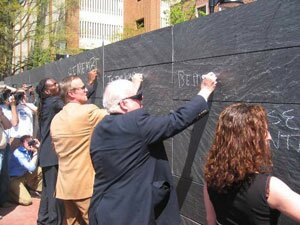
Along with DMB fiddler Boyd Tinsley, John Grisham, and Slate columnist Dahlia Lithwick, Garrett helped dedicate the Free Speech Wall in 2006. "Better him than us," Garrett wrote, pulling a line from his poem "Italian Lesson."
PHOTO BY DAVE MCNAIR
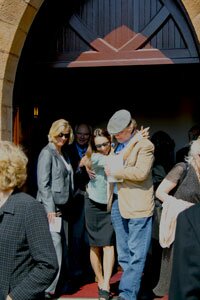
Novelists Anne Beattie and Richard Bausch give each other a hug after Garrett's memorial service.
PHOTO BY DAVE MCNAIR
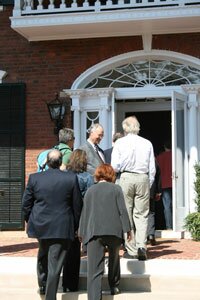
UVA president John Casteen hosted a reception at Carr's Hill after the service. "He took his work seriously," Casteen said of Garrett, "but never took himself seriously."
PHOTO BY DAVE MCNAIR
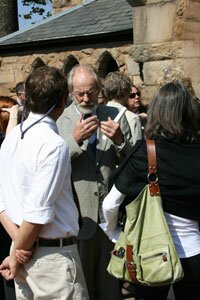
Novelist John Casey used Garrett's background as an amateur boxer as a metaphor to describe Garrett's approach to writing. "If you wanted to get a good punch in," he said, " you had to get in close enough to risk getting punched."
PHOTO BY DAVE MCNAIR
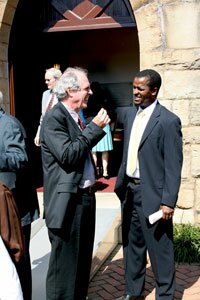
Writers Christopher Tilghman and William Henry Lewis share a laugh (telling George stories?) after the service.
PHOTO BY DAVE MCNAIR
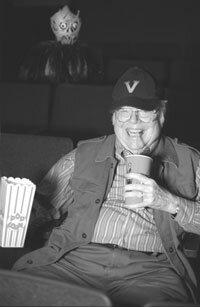
Garrett loved to talk about the screenplay he co-wrote for Frankenstein Meets the Space Monster, a 1960s science fiction movie that became a cult favorite and was later voted one of the 50 worst movies ever made. Here, Garrett poses for a 2003 Hook cover story about the making of the film. For Garrett, it was always a funny story about the absurdity of writing for Hollywood. .
FILE PHOTO BY JEN FARIELLO
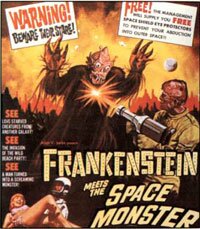
PUBLICITY PHOTO
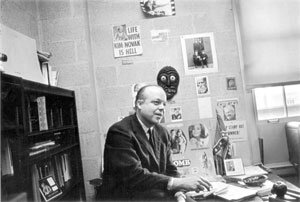
Garrett first began teaching at UVA in 1962, taking a position formerly held by Katherine Anne Porter and William Faulkner. He would leave in 1968 and later return in 1984, staying until his retirement in 2001. At the age of 32, Garrett had already published seven books, three of them in one year. At the time, Porter hailed him as America's most promising young writer.
PHOTO COURTESY GARRETT FAMILY
#
